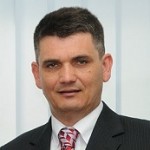
The group’s research activities take place within three laboratories: 1. CAD/CAM laboratory: 8 workstations with installed CAD/CAM software (CATIA, CIMCO, NOVACast, Matlab, WinNC), two control devices Sinumerik 840 and CNC turning machine EMCO PC Turn 50. 2. Laboratory for machine tools– equipped with traditional machine tools (lathe, milling machine, drill, band saw, grinders, planer machine, etc.), Vertical machining centre SPINNER VC560, Compressed Cold Air Cooling System (HKHZ) – Cold Air Gun 610 BSP Vortec, Minimum Quantity Lubricant System (MQL), 3D printer Z250 ZCorp, measuring equipment (cutting force, cutting torque, surface roughness, USB microcamera for tool wear measurements, power measuring device, etc.). 3. Forming laboratory is equipped with two hydraulic presses with a capacity of 70 t and 100 t with associated tools, a system for measuring dynamic and static deformation forces, a linear incremental encoder, etc. 4. Equipment in the Welding Laboratory enables all listed activities. Welding machine for cold TIG process can be paired with unit for linear mechanised welding and with selfmade electro-programmable device for arc time control. Welding can be performed by robotic MIG/MAG welding cell supported by off-line programming unit. Metallographic preparation of welded joints and their macroscopic analysis is possible too. One older version of A/D card is available too. Owing to the sponsors there is at the moment DC plasma welding power source in the Laboratory and it is used for research and for teaching purposes. It is planned (of course if allocated funds allow us) to buy one AC/DC plasma welding machine or working station.
Green production is a modern sustainable production strategy, and as such takes into account the needs of the economy, society and the environment. The research covered the implementation of an interdisciplinary view of the implementation and monitoring of green production. Emphasis is placed on material removal processes, deformation processes and technologies based on selected electric arc welding processes. In the part of the research related to material removal processes, activities are focused on advanced processing techniques such as processing using Minimum Quantity Lubricant System (MQL), Compressed Cold Air Cooling System (HKHZ) and processing with a combination of these two lubrication and cooling techniques.
The research group has already conducted preliminary research on the HKHZ technique in the milling process and constructed a system to combine the two listed cooling and lubrication techniques. It is planned to test the system and experimental research of different material removal processes with the application of conventional and alternative cooling techniques and comparison of results. Experimental research includes determining the influence of conventional and alternative coolants and lubricants on the corrosion properties of different materials (structural steel in the normalized state, tool steel in the improved state and stainless steel) at different processing parameters. The main idea of the research related to deformation processing is to design an innovative process of direct recycling without melting using the principles of severe plastic deformation and hot or cold compression and extrusion processes. Given the ecological and economic justification of the process, the mechanical and physical properties of semifinished products obtained by the new recycling process would be investigated in detail. With the technology of severe plastic deformation and manufactured tools, materials with a fine-grained structure would be made in order to improve the mechanical properties and for application in various technological processes. In order to describe innovative processes, mathematical models would be developed. Preliminary research will also be carried out on the preparation of materials by severe plastic deformation techniques for the semi-solid casting process (Thixocasting) and the production of metal foams directly from waste material.
Research activities related to the welding technology are aimed to broaden the application knowledge of electric-arc welding processes onto light structural alloys in conventional or additive manufacturing. Modern arc welding processes are encompassed by investigations to be performed and it is planned to obtain better insight in the physics of electric arc as a basics for numerical modelling. Thorough research activities performed till now enable us to proceed with experimental work and numerical heat flow calculations. Experiments shall be performed systematically in order to realise insight in some of the fundamental electric arc behaviour and at the same time to relate welding parameters to thermal effects on metals. Most of the welding trials will be performed on aluminium and its precipitation hardening alloys as well as on the cold working Al alloys. If possible, it is intention to research on some nickel and/or titanium alloys. It is the intention to make a correlation between welding parameters for layer deposition and its geometrical characteristics and/or selected mechanical properties of modern structural metallic alloys.
Investigations based on welding technology shall give insight in the energetic and ecological side in this project because they shall deal with efficiency of welding processes. The entire research group with the leader prof. Dražen Bajić will be included in researches. By applying an alternative type of cooling, recycling of the material waste, its processing into raw materials and by application of electric-arc welding processes for conventional and additive manufacturing of modern alloys, the group focused their activities on research related to sustainable production.